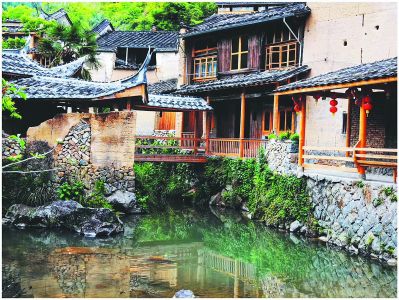

Longtan village, nestled deep in the mountains of Pingnan county, Ningde, southeast China’s Fujian province, has taken on a very special path of rural revitalization by developing its cultural and creative industry.

A corner of Longtan village(Photo/Li Rui)
In May 2017, the county set up an office to promote projects in the cultural and creative industry for traditional villages, and allocated 10 million yuan each year to support the sector’s development.
Thanks to this policy, Longtan has gradually established a multi-layered cultural and creative industry, starting with a studio that farmers can use to promote the development of integrated tourism and the transformation of the rural economy.
“Painting has changed the village,” said Lin Zhenglu, chief planner of the cultural and creative projects in Pingnan, who started by running a non-profit studio.
Shen Minghui, 30 years old, is one of the beneficiaries of this program. Born in Shuangxi village in the county’s Shuangxi township, he suffered an illness during his childhood and his mother died when he was 16 years old. At the end of 2015, on the recommendation of the county’s disabled persons’ federations, Shen came to the non-profit art education center run by Lin in Longtan village to study painting.
“The center provides free painting materials,” he said, adding that all income after deducting costs from sales of paintings are distributed to the painters.
Over four years later, Shen can now earn 4,000 to 5,000 yuan per month through online sales of his paintings, which have a unique style. “I can earn my own living through painting, have broader horizons and become more confident,” he said.
In 2017, Shen’s works went on display at the Lyon Contemporary Art Biennale in France, a high point in the international art calendar. He also has his own studio.
About 100 villagers in Longtan have received training in painting. “Villagers increase their income and have a broader vision through painting,” said Lin.
“Due to a lack of industrial development, most villagers tended to seek work outside and only about 200 of the more than 1,400 villagers would stay permanently,” said Xia Xingyong, the village’s first secretary, adding that over 120 buildings dating back to the Ming and Qing dynasties in the village could not be restored due to a lack of funds.
In 2017, Zeng Wei, a young man from east China’s Jiangxi province, rented a century-old dwelling in the village and transformed it into a bookstore, which has now become a tourist destination.
“In order to revitalize the village through the development of the cultural and creative industry, we focused on attracting talents like Zeng,” Xia said, explaining that the Party committee of Longtan village rents out ancient dwellings to new arrivals for 15 years at 3 yuan per square meter, then distributes the income to villagers. The renters are responsible for renovating the buildings by hiring veteran craftsmen from the village, and the dwellings have to be restored to their original appearance.
“The most obvious change in the village is that it has become busy again,” Xia said, noting that over 100 people from Beijing, Shanghai and Chongqing have transformed 36 ancient buildings in the village into concept stores.
Inspired by these new arrivals and their cultural and creative projects, more than 300 villagers have returned to their hometown to start businesses.
Known for Siping Opera, a national intangible cultural heritage once considered lost but now seeing a revival in Longtan, the village now has more than 600 permanent residents, while Longtan attracts over 200,000 tourists each year.
“Last year, the per capita income of villagers hit 18,350 yuan, which was three times more than before the introduction of the cultural and creative industry," Lin said, adding that the village has developed the first stage of a unique cultural and creative sector.
“We will strive to develop mature forms of business and realize sustainable development to bring about greater potential for development,” Lin said.
 Fire brigade in Shanghai holds group wedding
Fire brigade in Shanghai holds group wedding Tourists enjoy ice sculptures in Datan Town, north China
Tourists enjoy ice sculptures in Datan Town, north China Sunset scenery of Dayan Pagoda in Xi'an
Sunset scenery of Dayan Pagoda in Xi'an Tourists have fun at scenic spot in Nanlong Town, NW China
Tourists have fun at scenic spot in Nanlong Town, NW China Harbin attracts tourists by making best use of ice in winter
Harbin attracts tourists by making best use of ice in winter In pics: FIS Alpine Ski Women's World Cup Slalom
In pics: FIS Alpine Ski Women's World Cup Slalom Black-necked cranes rest at reservoir in Lhunzhub County, Lhasa
Black-necked cranes rest at reservoir in Lhunzhub County, Lhasa China's FAST telescope will be available to foreign scientists in April
China's FAST telescope will be available to foreign scientists in April "She power" plays indispensable role in poverty alleviation
"She power" plays indispensable role in poverty alleviation Top 10 world news events of People's Daily in 2020
Top 10 world news events of People's Daily in 2020 Top 10 China news events of People's Daily in 2020
Top 10 China news events of People's Daily in 2020 Top 10 media buzzwords of 2020
Top 10 media buzzwords of 2020 Year-ender:10 major tourism stories of 2020
Year-ender:10 major tourism stories of 2020 No interference in Venezuelan issues
No interference in Venezuelan issues
 Biz prepares for trade spat
Biz prepares for trade spat
 Broadcasting Continent
Broadcasting Continent Australia wins Chinese CEOs as US loses
Australia wins Chinese CEOs as US loses